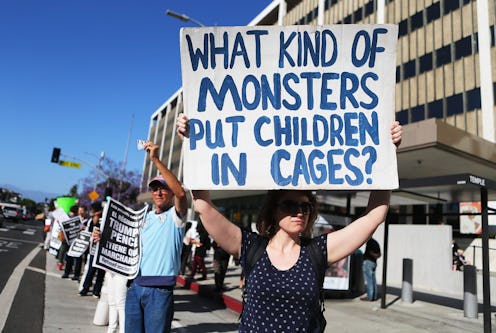News
Why Keeping Tabs On Detention Centers For Migrant Kids Is About To Become Way Harder

Trump may have just ended the family separation policy for parents and children at the United States-Mexico border, but that doesn't mean those current detention facilities are shutting down anytime soon. What's more, lawmakers looking to find out what migrant children detention centers are like are about to have an even tougher time. A new order by the Department of Health and Human Services (HHS) will now require members of Congress to give detention facilities up to two weeks' notice prior to visiting the facilities in person — and they won't be allowed to speak to the children at all.
The order, which was given by the HHS in an email sent to all congressional offices on Wednesday, according to Huffington Post, explained that members would not be allowed to take any pictures of the interior of the facilities, either.
The order read, "To protect the privacy and vulnerability of children in its care, we cannot allow visitors to record or photograph anything within the facility property, nor are visitors allowed to interact with the children."
Huffington Post also noted that the email had a series of stipulations about visiting hours, which (in addition to requiring two weeks' notice) clarified that times and dates of visitation would be dependent upon "facility availability."
This increased barrier to transparency between detention facilities and the public comes at an especially alarming time, given the recent lawsuit alleging horrific practices of forcibly medicating migrant children at the Shiloh Residential Treatment Center. Bustle has reached out to both the Department of Justice and the Shiloh Treatment Center.
Over 25 affidavits in the lawsuit detail the extent to which supervisors allegedly medicated children with the intent of "controlling their behavior" via a variety of psychotropic and anti-psychotic medications. Many of these medications allegedly made the children feel dizzy, incapacitated, sleepy, and even led to injuries due to their altered states. In several instances, children were allegedly taking over 10 pills a day, none of which they were given information about, and some of which were claimed to be vitamins.
What's more, The Cut notes the "jail-like" conditions of several detention facilities currently housing migrant children who have been separated from their parents. One such example can be found in Ursula, the detention facility in Texas that NBC News reported to be a series of chain-linked fences holding groups of children who were given green sleeping pads and space blankets to sleep upon.
During a tour given to reporters on Father's Day (one which, it seems, would no longer be allowed under the new protocol), cameras were not allowed, but Border Patrol later released photographs that revealed the living quality of the 1,129 migrants who were detained in the 77,000-square-foot warehouse-like facility.
Via NBC News, Border Control explained that the detainees were sorted into one of four pods: girls 17 and under, boys 17 and under, mothers with children, and fathers with children.
Shiloh Residential Treatment Center has similar conditions to Ursula, with photos revealing "migrants lying shoulder to shoulder on bare concrete walls while neighboring cells are empty," according to The New York Times. Men were also notably drinking from a single gallon jug of water in the photos, which appeared to be the only source of drinking water they had.
The ability for congressional members to have access to these detention facilities is incredibly important, since the children within those facilities might not be immediately reconnected with their parents. As a result, politicians such as Kamala Harris (D-Calif.) are calling for a total revamp to the state of detention facilities, which she claims are "massive and rampant with abuse," in the United States.